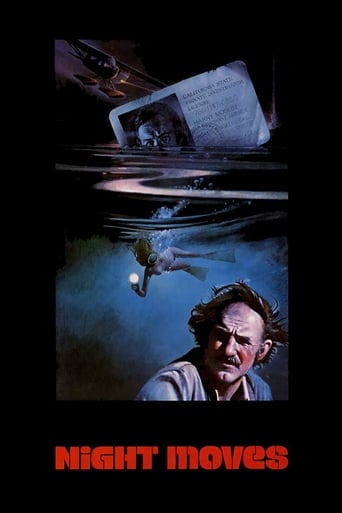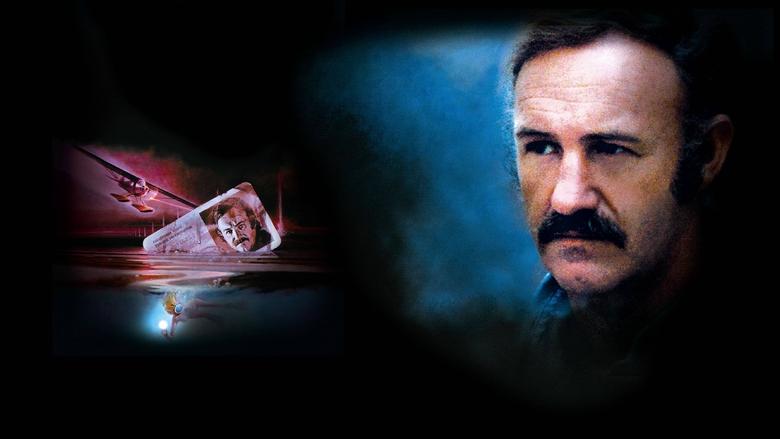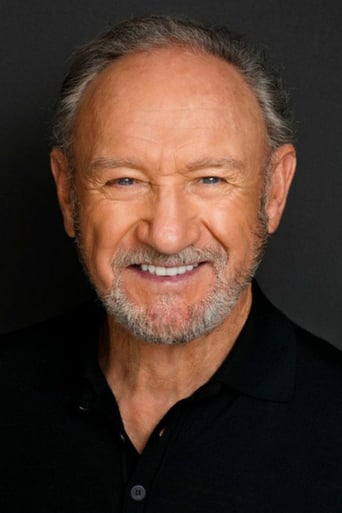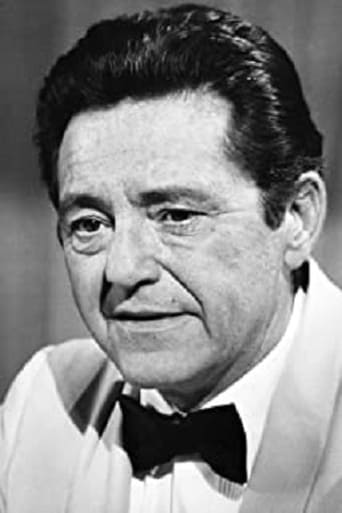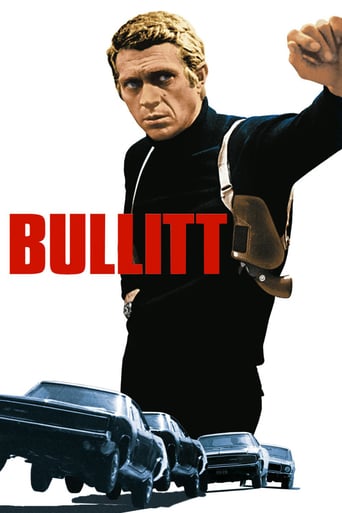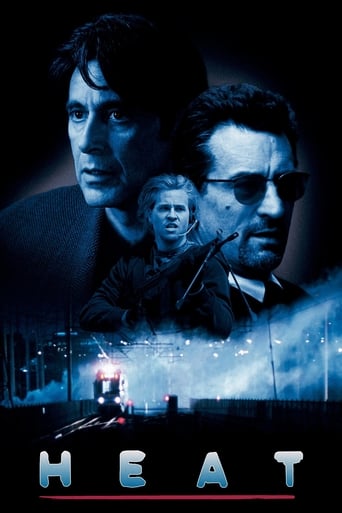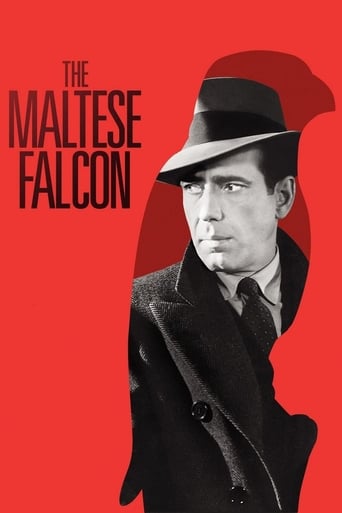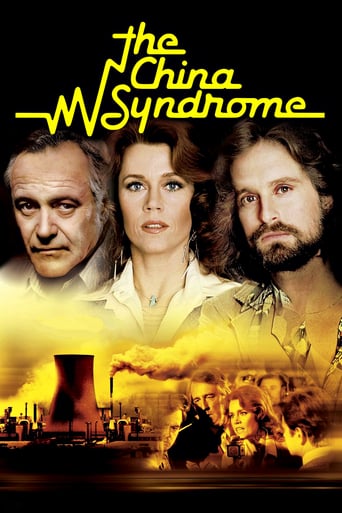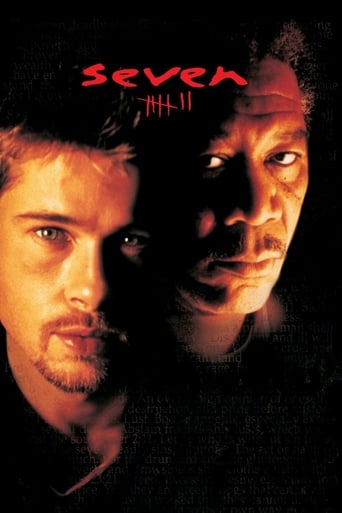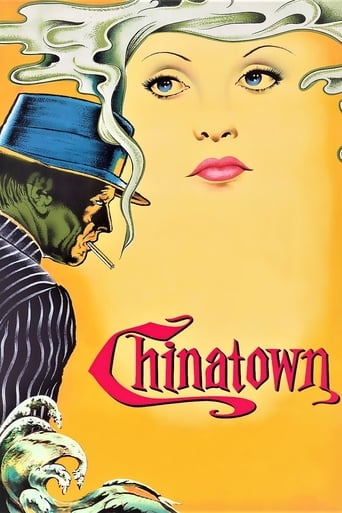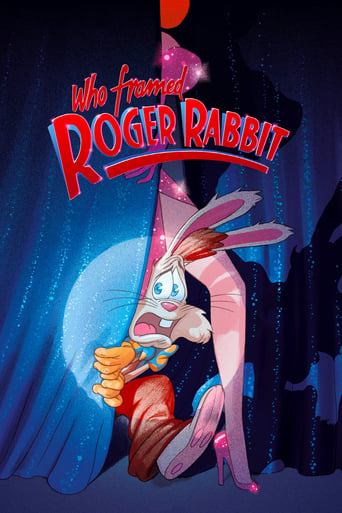Night Moves (1975)
Private detective and former football player Harry Moseby gets hired on to what seems a standard missing person case, as a former Hollywood actress whose only major roles came thanks to being married to a studio mogul wants Moseby to find and return her daughter. Harry travels to Florida to find her, but he begins to see a connection between the runaway girl, the world of Hollywood stuntmen, and a suspicious mechanic when an unsolved murder comes to light.
Watch Trailer
Cast


Similar titles
Reviews
As the story unfolded, I assumed I was watching the filmization of a Ross Macdonald novel. All the characteristics and typical Ross Macdonald touches were there - from the snappy dialogue (when asked to My Night With Maud, the hero replies that seeing a Rohmer film is like watching paint dry; when asked to share the tub with a Hollywood hot-light, the hero replies that he'll keep it in mind for when he's feeling really dirty; when the hero asks Paula, as a plane lands outside the cabin, "Is that Tom now?", she comes back, "It isn't Lindberg!") to the technique of using a multi-stranded, multi-plotted detective story to pull away seamy layer after seamy layer of Los Angeles "society". It's a world in which nobody is as friendly as they seem on the surface, where the thickly-veiled threat is often followed through by naked action. And as too in Ross Macdonald, the plot is damned difficult to follow, part of the reason for this being that it is not regarded as all that important, merely a means to sociological and anthropological ends. I've seen the film twice now and I still can't follow it and it still doesn't make sense. However to judge it on the shortcomings of the plot, is to do the film a grave disservice. It's the characters and the atmosphere that count, Night Moves assembles some great characters, very cleverly and skillfully played and creates a powerful atmosphere abetted by the sharp location shooting by Bruce Surtees, the music score, and the film industry background that runs underneath it all. Yes, Night Moves is a film to see yet a third time!OTHER VIEWS: A confused and confusing plot, realistically acted, but - aside from one or two moments - directed in a disappointingly ordinary fashion. I expected a lot more drama from Arthur Penn. True, there's a bit of exciting action, but it's smothered under reams of dull talk. The photography is deliberately low-key.
Years ago, I was a therapist who worked with clients who had been sexually abused. Because of this, I am probably a lot more sensitive to these sort of themes than the average person. And, I found it very disturbing that in "Night Moves" you have an underage actress (Melanie Griffith) performing nude quite a bit. It isn't that she was a big turn on for me...but I worry some depraved guy might really, REALLY love the film simply because you get to see a naked 16-17 year-old. I mention this because viewers might wanna consider that when they are thinking about watching the movie.The story is about a rather earthy and non-glamorous private investigator, Harry Moseby (Gene Hackman). He is odd...oddly distant with his wife, full of ennui and oddly underplayed and nothing like the usual tough guys who played private eyes in the good old days. His job in this one is to locate the runaway daughter of some over-the-hill actress...and considering she pays well, Harry seems more than ready to take the case. The case takes him from Hollywood to the Florida Keys and, oddly, following the case his life is turned upside down and he begins to evaluate himself and the pathetic state in which he's gotten himself...and he's ready to give up the private eye racket. So what's next for Harry? Well, this this only takes us up to the midway point...a lot!This film really excels when it comes to realism. This does mean that the language is VERY earthy for a 1970s film and there's ample nudity as well. Surprisingly, it's not as violent picture as it could have been, considering it was directed by Arthur Penn of "Bonnie and Clyde" fame. Mind you, it IS violent...just not "Bonnie and Clyde" violent! There is, however, a really horrifying death scene out on the water...but also incredibly original and gritty. Overall, well made...and a bit disturbing. Surprisingly, despite being a very good film the studio shelved it for two years because you can only assume they had no faith in the product.By the way, in one scene a lady Harry meets tells him that sharks cannot stop swimming. This is a common myth and many types of sharks indeed stop and rest. In particular, Nurse sharks (common in the Florida Keys) love to lie on the bottom and can go without moving for long periods. The same is true for some other reef sharks...and I've dived around them and photographed them resting away and NOT dying as a result! They should have researched this better, since the lady supposedly lived in the Keys and should have known this.
Private eye Harry Mosby (Gene Hackman) in Los Angeles is hired to bring back the daughter of a former film star and has to go to the Florida keys to get her. Melanie Griffith in her first film role as the daughter is reluctant but goes back with Mosby but there is more - a sunken treasure and a few people who make movies are involved before a surprising finale occurs. And Mosby is just as surprised as the audience every step of the way. Harry Mosby is in the tradition of an incorruptible hero in the midst of the muck. I think that the ending could be considered optimistic, but it is open to interpretation. It's a dark film, as in "Chinatown" land, when the protagonist ends up in a boat going around in aimless circles with a flesh wound to the leg. Since Mosby and his wife have reconciled earlier in the film, I think it's fair to assume that they will try to make a go of it together, rather than ending up dead or lost, like every other character in the movie. Gene Hackman's lone foray into the private eye genre is fortuitous. Like Bogey and Paul Newman, he is especially deft at put downs of smarmy guys and gals. And Alan Sharp's generally well written screenplay gives him ample opportunity to display this skill. Arthur Penn's direction is well paced and does not draw undue attention to itself. Occasionally, the film gets a bit pretentious. For example, I could have done without the not especially revealing anecdote that Harry relates about his father, and any time chess is mentioned in a private eye flick the pomposity level goes up. But mostly it's good seventies noir.
Night Moves (1975)An odd convolution of 1940s film noir and 1970s New Hollywood. The hero is a kind of watered down Bogart—not as romanticized, and with less exaggerated one-liners (which film noir lovers will miss but which those who like realism will appreciate). Gene Hackman is terrific, and he plays Harry Moseby, a down and out ex-football player with a drained candor that makes him pathetic as much as likable. He ends up mixed up in a Dashiell Hammett kind of plot, for sure, looking for the daughter of a rich woman and then getting way over his head.The artifacts of New Hollywood liberation are plain to see: nudity (female only) and a kind of sexed up background even when the plot is going somewhere else. This was for the sake of an audience still astonished that the movies could do such things (they couldn't before 1967) and it's still kind of raw and edgy in a lasting way. It also feels dated, too, making you wonder if it was really so sexually liberated back then.The trail for this daughter takes us to the Florida Keys and out into the ocean. There are mysterious motives everywhere, and it's only Moseby we trust. Completely. And we even feel him starting to get a grounding for his drifting self amidst these miscellaneous people. And we see a kind of generosity that is based on this selfish need to do something right, and all its conflicting meanings. So eventually the movie is less about who killed who for this or that reason, and more about this man and his quest for clarity.But clarity has a cost, and the movie will take several surprising turns. Not all of the plot is supported very well. We are led along at times, and frankly told things that might have been better revealed through the plot. It's not a perfectly nuanced drama in this way. These are nitpicks, for sure, because the larger feeling takes over and is commanding. And that's the lasting reputation of the film, that it pulls off this kind of modernized noir world with originality.The director is Arthur Penn, who's great "Bonnie and Clyde" kicked off the shift into New Hollywood sensibility. (Beatty is always given too much credit for that film's audacity because he starred and funded it, but the film was Penn's at heart.) This might be called the last of Penn's great cycle from the period, and if not the equal to his 1967 breakthrough, it is in many ways more delicately felt and mature. And so in a way more watchable today a second or third time. Hackman is the one great actor here, however, and if there's a key problem with "Night Moves," it's that he almost but not quite supports the film alone. The three or four secondary characters are all of them thin, or contrived to be types, and so it falters.See it anyway. It surprised me the way "Point Blank" from this era did. Excellent.

